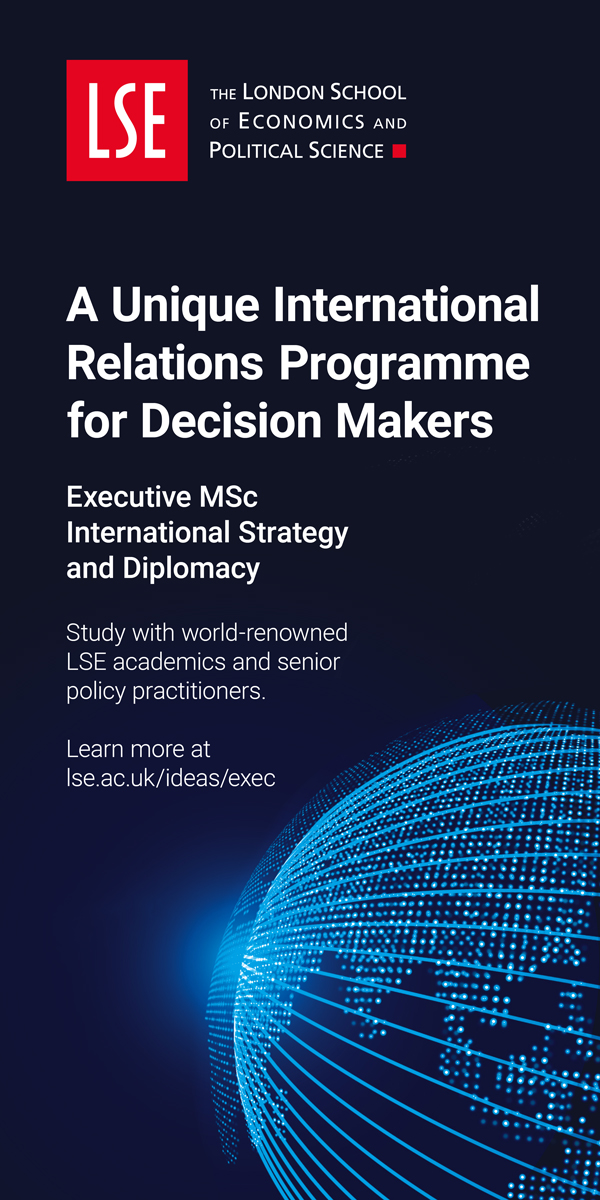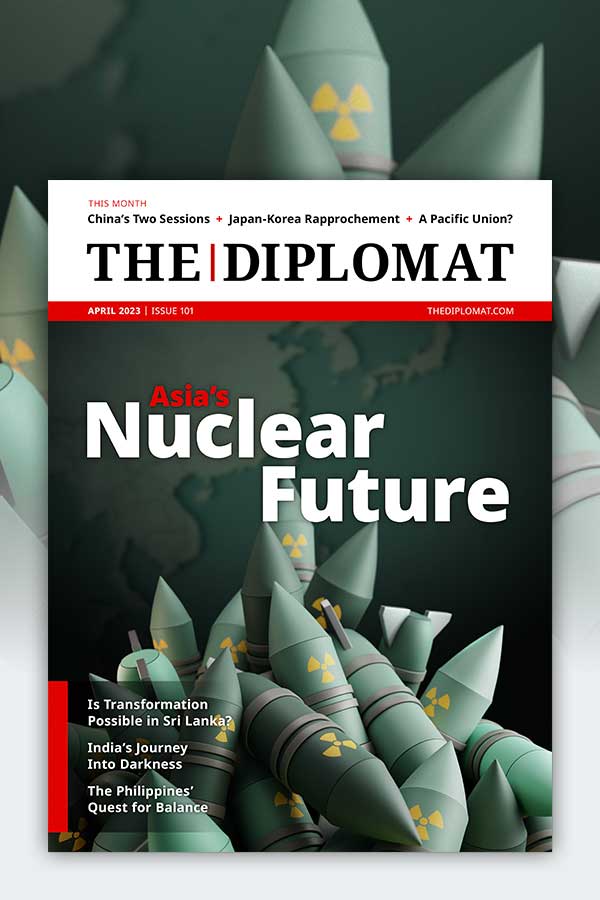| Welcome to the latest issue of Diplomat Brief. This week our top story explores the latest step in the “normalization” of Japan’s security apparatus: offering Official Security Assistance to other countries. We also have an interview with Ahmad Shuja Jamal on his new book, which seeks to explain the decline, and ultimate demise, of republican Afghanistan. |
| Story of the week | ![[object Object]](https://thediplomat.com/diplomat-brief/2023/vol15/images/feature-1.jpg) | Environment Japan’s Official Security Assistance: The Sleeping Giant Stirs?What Happened: Under the Kishida administration, Japan is leaning even further into a pre-existing trend of “normalizing” Japan’s armed forces and security cooperation. One aspect of the shift is the advent of Official Security Assistance, which will see Japan offer equipment, supplies, and deepened security cooperation to “like-minded countries” – and specifically includes the goal of helping other countries enhance their deterrent capabilities. Notably, however, OSA will still have to follow the general restrictions on Japan’s defense exports, including a prohibition on sending arms to a party in an ongoing conflict (for example, Ukraine). Our Focus: Talk of Japan actively bolstering another country’s deterrent capabilities “would have been unthinkable only a short while ago,” James Kaizuka, a Ph.D. candidate at the University of Leeds, writes for The Diplomat. Yet “OSA has thus far seen little or no such opposition… This speaks to how far the security discourse has shifted in Japan.” Still, OSA was crafted with care to avoid provoking the still-strong pacifist tendencies held by many in Japan. Official discussions emphasize the use of OSA in humanitarian aid and disaster relief operations. Even the name is an attempt to pre-empt criticism: “By presenting the initiative as almost a natural extension of existing ODA [Official Development Assistance] and focusing on the similarities to it, the initiative staves off criticism.” What Comes Next: Overall, Kaizuka concludes, “The OSA framework as such remains deeply cautious in its approach. It specifically and deliberately targets only ‘like-minded countries’ and couches itself in the language of assistance rather than outright strategic cooperation or alliance.” But it must be viewed in the context of a gradual loosening of Japan’s “pacifist-isolationist norms” that has taken place over the past decade-plus, and over that timeframe has significantly shifted the bounds of security policy. The real question, then, is how the OSA will evolve from here. Read this story |
| Behind the News | INTERVIEW Ahmad Shuja JamalAhmad Shuja Jamal, the director-general for international relations and regional cooperation at the Afghan National Security Council under the Ashraf Ghani administration, on the U.S. role in the Taliban’s takeover of Afghanistan: “What triggered the collapse was the cascade of events put in motion by the misguided American diplomacy with the Taliban, followed by unilateral withdrawal without arrangements for Afghan forces to sustain themselves. Read the interview |
| This Week in Asia | Northeast Asia Brazil’s Lula Comes to ChinaBrazil’s new president, Luiz Inácio Lula da Silva, is visiting China from April 12 to 15, a make-up for a previously scheduled visit that had to be postponed due to a case of pneumonia. Lula had pursued closer China ties during his previous term (2003-2010), but his immediate predecessor as president, Jair Bolsonaro, took Brazil in the opposite direction. Lula returns to power in drastically different geopolitical milieu. His China trip will be an important signal for Lula 2.0’s China policy – and a bellwether for Beijing’s involvement in Latin America moving forward. Find out more | South Asia Pakistan Hails Arrest of Baloch Separatist LeaderThe Pakistan Army announced last week that it had arrested Baloch militant leader Gulzar Imam alias Shambay, the founder of the Baloch National Army (BNA). He is the first Baloch separatist leader to be taken alive, and Pakistan’s army is claiming a major victory for its counterterrorism operations. But with terrorist attacks and militancy on an upswing overall, it remains to be seen whether Imam’s arrest ushers in the promised “new era of peace.” Find out more | Southeast Asia South China Sea Prompts Controversy in MalaysiaThe Malaysian government has been forced to clarify its position on the maritime disputes in the South China Sea, after an outbreak of partisan rancor between Prime Minister Anwar Ibrahim and opposition leader Muhyiddin Yassin. The dispute centered on comments that Anwar made last week after his return from a state visit to China, in which he said that he was open to “negotiations” over the long-running maritime disputes, a remark that Muhyiddin described as “reckless.” While the Ministry of Foreign Affairs issued a statement affirming that the country’s position on the South China Sea was “consistent and remains unchanged,” it raises the prospect of sensitive foreign policy decisions being impacted by the country’s bitter political divides. Find out more | Central Asia Old Tricks in New UzbekistanUzbekistan’s long road to constitutional reform under the Mirziyoyev government is nearing its end, with a referendum scheduled for April 30. While the referendum may be employing old tricks to extend Mirziyoyev’s rule, the president’s legitimacy is built upon his reform push – a total reversion to the “old ways” could also prove detrimental to his regime. Find out more |
| Visualizing APAC |  | China’s post-reopening COVID-19 surge laid bare the inequities in urban vs. rural healthcare, including in the number of health workers per capita. See the full picture |
| Word of the Week | Diplomacy 支票簿外交Zhīpiàobù wàijiāo, Mandarin for checkbook diplomacy, is a term used in Taiwan to describe attempts to “buy” the loyalty of diplomatic allies – like Honduras, which dropped Taipei for Beijing in March, reportedly after Taiwan refused a demand to provide $2.45 billion to the Castro government. Find out more |
| Webinar Alert | The Diplomat Asks Where Are Australia-China Relations Headed?Since a new Labor government in Australia was installed in May 2022, there have been signs of a thaw in Australia-China relations. That includes a top-level meeting between Prime Minister Anthony Albanese and President Xi Jinping; the resumption of ministerial visits; and the removal of some of the tariffs China had imposed on Australian goods. At the same time, however, Australia's new government continues to advance its participation in AUKUS and the Quad, both of which are viewed as countering China. How far can the Australia-China thaw go, and what lies ahead for the relationship? Join us on April 17 at 8 p.m. U.S. Eastern time (April 18 at 10 a.m. in Sydney) for a webinar outlining the latest developments in Australia-China relations. Featuring Dr. Michael Clarke, a Senior Fellow at the Centre for Defence Research at the Australian Defence College and an Adjunct Professor at UTS:ACRI. Dr. Jennifer Hsu, a Research Fellow in the Public Opinion and Foreign Policy Program at the Lowy Institute. Dr. Zhongzhou Peng, a post-doctoral researcher at the School of International Relations and Public Affairs, Fudan University. Sign up for the webinar |
|  |


![[object Object]](https://thediplomat.com/diplomat-brief/2023/vol15/images/feature-1.jpg)

